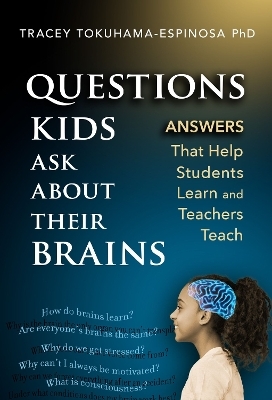
Questions Kids Ask About Their Brains
Teachers' College Press (Verlag)
978-0-8077-6964-5 (ISBN)
Book Features:
A window into students’ thoughts and concerns about themselves as learners and beings in today’s complex world.
A special chapter for classroom teachers with activities and guidance for integrating the information into P–12 lessons.
Big Ideas for readers looking for solutions they can quickly implement in their classroom.
Detailed answers, along with QR codes to the research articles behind them, for readers looking for more in-depth knowledge about learning and the brain.
Insights from a year-long international study in 21 countries that asked kids what they wanted to know about their own brains.
Tracey Tokuhama-Espinosa, PhD, is an instructor at the Harvard University Extension School in a course called the Neuroscience of Learning: An Introduction to Mind, Brain, Health, and Education. She has taught at kindergarten through university levels, is the associate editor of the peer-reviewed journal Science of Learning, and is an international educational consultant. Her books include Bringing the Neuroscience of Learning to Online Teaching: An Educator’s Handbook and The New Science of Teaching and Learning.
Contents
Acknowledgments ix
Preface xi
Questions as a Gateway to the Mind xi
How to Read This Book xii
1. The Pedagogy of Listening 1
A New “Theory of Brain” to Complement “Theory of Mind”? 3
Where the Questions Come From 4
2. Life Changes the Learning Brain 6
What You Know Influences What You Can Know 7
Educators, Mind, and Brain 10
3. Identity: Who Am I? 12
Similarities and Differences 12
Nature via Nurture Plus Free Will 15
Perception 26
Self-Awareness 28
Summary 34
Resources to Extend Learning 35
4. Structure: What Is the Physical Structure of the Brain? 36
Color and Texture 37
Weight and Size 38
Divisions of the Brain 42
Hemispheres and Laterality 53
Neurons and Synapses 58
Blood and Nerves 63
Summary 66
Resources to Extend Learning 66
5. Growth: How Does the Brain Develop? 67
Babies’ Brains 67
Children’s Brains 72
Adolescent Brains 77
Adult Brains 82
Old Age 83
Brain Death 87
Afterlife 90
Summary 91
Resources to Extend Learning 92
6. Function: How Does the Brain Work and Stay Healthy? 93
Brain–Body Connection 93
Control and Choice 94
Sleep and Dreaming 98
Nutrition 114
Physical Activity 119
Summary 122
Resources to Extend Learning 122
7. Emotions and Feelings: What Does My Brain Have to Do With My Feelings? 123
Emotional Processing 123
Emotional Triggers 131
Emotional Load 136
Relationships 141
Negative Emotions 144
Positive Emotions 153
Motivation, Boredom, and Procrastination 158
Summary 166
Resources to Extend Learning 167
8. Memory, Attention, and Executive Functions: What Are the Building Blocks of All Learning? 168
Memory 169
Attention 186
Executive Functions 194
Summary 202
Resources to Extend Learning 203
9. Learning: How Does Stuff Get Into Our Brains So We Can Use It in the Future? 204
Processing 204
Connectivity 206
Cognitive Load 210
Maximum Potential 213
Innate Intelligence 214
Best Learning 218
Speed and Range 219
Genius, Gifted, and Talented 222
Creativity and Imagination 224
Problem-Solving 226
Training and Studying 228
Summary 232
Resources to Extend Learning 232
10. Problems That Impede Learning: Why Are There Brains That Work a Little Bit Differently? 233
Dyslexia 234
Attention Deficit Hyperactivity Disorder (ADHD) 236
Executive Dysfunction 241
Headaches, Brain Damage 241
Obsessive-Compulsive Disorder (OCD) 245
Addiction 246
Psychopaths 248
Brain Health 250
Summary 251
Resources to Extend Learning 253
11. Final Thoughts 254
References 257
Index 259
About the Author 271
| Erscheinungsdatum | 25.04.2024 |
|---|---|
| Verlagsort | New York |
| Sprache | englisch |
| Maße | 156 x 229 mm |
| Gewicht | 408 g |
| Themenwelt | Schulbuch / Wörterbuch |
| Geisteswissenschaften ► Psychologie ► Entwicklungspsychologie | |
| Geisteswissenschaften ► Psychologie ► Pädagogische Psychologie | |
| Sozialwissenschaften ► Pädagogik | |
| Sozialwissenschaften ► Soziologie | |
| ISBN-10 | 0-8077-6964-9 / 0807769649 |
| ISBN-13 | 978-0-8077-6964-5 / 9780807769645 |
| Zustand | Neuware |
| Haben Sie eine Frage zum Produkt? |
aus dem Bereich


